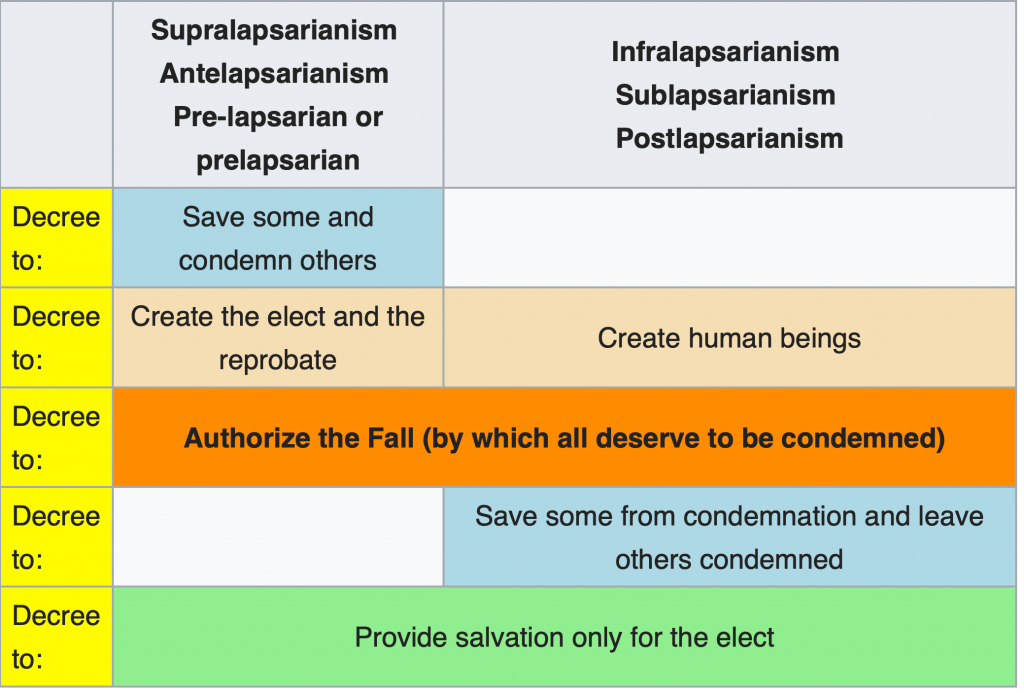Among the theological topics I am interested in, soteriological issues pique my interest. As a theologian who holds to Calvinistic soteriology, I get to be asked a lot of questions on Calvinism. In this post we will tackle a somewhat technical question related to Calvinism, Infralapsarianism, Sublapsarianism, or Supralapsarianism. My response is stated below after the question.
Question: First off, I want to affirm that I believe in God’s Sovereignty. I have no problem with that. And yes, God could save everyone and yes, he’s not oblige to. But you and I know that Universalism is not taught in the Bible.
When you said he chose to save some, when did that chosing occur? Before or after the Fall? Which sysretem do you follow? Infralapsarianism, Sublapsarianism, or Supralapsarianism? When you said He “leave others to the consequences of their sin,” you mean damned others to go to Hell even before they were born, right?
Let me address the issue you brought up in your second to the last comment one by one as you have brought up several. With regards to the issue as to the issue of Infralapsarianism, Sublapsarianism, or Supralapsarianism, before I answer that question let us define those first for the sake of others who is reading or will be able to read our interaction.
In Calvinistic soteriology, those are the terms referred to when talking about the logical order of God’s decrees. The common word among those three is “lapse” or the slipping or falling or more particularly man’s fall into sin from the original state of innocence. The question revolves around the order of events from God’s perspective in which he determined what would happen.
So among the questions that is attempted to be answered is did God create man then decreed mankind to fall into sin, did he decree that they fall into sin through their own determination? Did he decree the election of some and the eternal condemnation of others and if this is so when did this happen, before or after he created them? These indeed are interesting but perplexing questions.
I have attached a table that I grabbed somewhere in the internet in order to somehow simply explain these concepts. (See above)
Let me just highlight that these issues surfaced when Calvin already passed away. The Supralapsarian views was formulated by Theodore Beza a disciple of John Calvin and his successor and one of the teachers of Jacobus Arminius. The supralapsarian view has this logical order: (1) God decreed the election of some and the eternal condemnation of others, (2) God decreed to create those elected and eternally condemned, (3) God decreed to permit the fall, and (4) God decreed to provide salvation for the elect through Jesus Christ.
A lot of non-Calvinist think that supralapsarianism is what Calvin and Calvinism teaches.
Although there are several well known theologians that hold on to the supralapsarian view, historically the supralapsarian view is a minority view among Calvinists. The majority view among Calvinist is infralapsarianism with this logical order: (1) God decreed the creation of mankind, (2) God decreed mankind would be allowed to fall into sin through their own self-determination, (3) God decreed to save some of the fallen, and (4) God decreed to provide Jesus Christ as the Redeemer. Although not explicitly mentioned, the infralapsarian view is that which is expressed in the Synod of Dort.
My personal view on the matter is this. Although this may indeed be a serious theological issue that is worthy of discussion, assuming something from an event in eternity past (from our perspective), using logic to reconstruct what could have been and placing such in a temporal framework, that is the human understanding of cause and effect and our limited understanding of time is too much. Our finite minds cannot fathom how and infinite God operates and how these things are sequenced from his own time frame, which I would call “eternal time” as opposed to “temporal time” (for lack of better terms) Theologians who debate these things assume a logical sequence base on an understanding of cause and effect. But assuming these things requires them to confine the mind of God into finite time. God operates in eternal time and we can never fully fathom how he operates and in what sequences he does things as eternal time operates beyond the cause and effect limitations of temporal time.
Nevertheless since the Bible is the basis for our faith and the Bible tells us how God operates, among the above views, the infralapsarian appears to be the most Scriptural. The Bible never portrays God as creating people for the purpose of condemning them to hell. (This also answers your question on what I meant when I wrote “He (God) left others to the consequences of their sin,” my answer is I subscribe to the infralapsarian view as can be seen in the Scriptures.
But in all honesty as I stated these are things (The logical order) beyond are comprehension and it is best to leave it as one of the million of questions that we are going to ask the Lord when we see Him face to face. The secret things indeed belong to the Lord and who can know His thoughts and ways ?
 Hi ! my name is Zigfred Diaz. Thanks for visiting my personal blog ! Never miss a post from this blog. Subscribe to my full feeds for free. Click here to subscribe to zdiaz.com by Email
Hi ! my name is Zigfred Diaz. Thanks for visiting my personal blog ! Never miss a post from this blog. Subscribe to my full feeds for free. Click here to subscribe to zdiaz.com by Email
You may also want to visit my other blogs. Click here to learn more about great travel ideas.


Leave a Reply